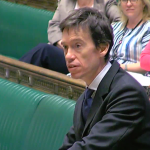There are many drivers of prison violence – the greatest is probably the surge in the use of Spice and other mind-altering drugs. But the trend is clear. Assaults have risen steadily over the last five years and there were more than eight thousand attacks on prison staff last year alone. Violence wrecks prisons. It doesn’t only make it challenging to perform the most basic tasks – from cell inspections, to running classes for prisoners – it poses an unacceptable risk to our staff; it makes it very difficult to turn around prisoners’ lives, to prevent reoffending and ultimately to protect the public.
So our key task must be to reduce violence in prisons. We have begun by recruiting an extra 2,500 prison officers – creating a key-worker system where each officer is assigned around six prisoners, spending at least forty-five minutes a week with each, one on one, developing a constructive relationship and working on their behaviour and needs. But this will not be enough, unless we achieve three further things: massively reduce the supply of drugs; restore basic decency; and above all provide the training and support for prison officers to challenge the behaviour that drives violence.
We have an increasingly detailed understanding of how new psychoactive substances have driven prisoners into aggressive frenzies, and self-harm, and trapped them in dangerous drug-debt. And we have better intelligence on how organised criminal gangs smuggle the substances in. But we should and can do far more to improve our basic security procedures. Better netting and window-grilles will prevent throw-overs and drones, new body scanners will detect drugs being smuggled in through the gate. So will more sniffer dogs. And we need to improve our searching of everyone who enters the prisons – accepting that, although the vast majority of families and prison officers are not engaged in the trade, we need to search and catch those who are.
The second priority, is to restore basic decency. Broken windows are not only unsightly – and a route for drones – they breed a culture of carelessness, while filth and graffiti around the cells breeds resentment and violence.
But the most important priority is to provide training and support to our staff, and in particular to the uniformed officers, working long shifts outside the cell doors. We need to invest in the slightly more senior staff – ‘Band 4 Officers’ in our language – and help them to be role-models for the new staff on the landings. We need to provide a staff college to make sure that governors have the best possible training before they take over a prison. And above all we need to invest in the thousands of officers who have recently joined the service.
Prisons can be intensely intimidating environments. It is not easy, for example, to know what to do if a prisoner swaggers up to you on a busy landing and swears at you. I recently witnessed an officer who chose to simply ignore it, telling me that the prisoner had a troubled past. But, if we are serious about getting on top of violence, we need to train new officers on how to challenge such behaviour. Ignoring aggression doesn’t help the prisoner, who needs to learn to take responsibility for his behaviour. And it has a destructive impact on the hundred other prisoners, who witnessed that scene and suddenly feel less safe on the landings – or feel tempted to be violent themselves.
We have to set very clear expectations about behaviour for prison officers and prisoners – right down to the way clothes are worn, the state cells are kept in, and prisoners’ attendance at education or work. Clean, regularly inspected cells, for example, make it more difficult to hide or use drugs; order, calmness and safety are all mutually reinforcing. But enforcing high standards takes incredible energy, and commitment from prison officers day in and day out. They have to be strict and consistent, while also treating prisoners with dignity, and making it clear that the objective is not to exercise power, but to change lives, and thus prevent reoffending. In other words, for the Prison Service, as much as for, say, the Army, or a great company, it all comes down to how well you train and support the people on the frontline.
We have more than a hundred different prisons, each with a slightly different history, and culture, staffed by tens of thousands of people – some of whom have been working for forty years. No-one can hope to change an entire system overnight. So we have selected ten prisons to roll out this model. They include some of the prisons with the worst drug figures in the country, and some of our toughest prisons from Wormwood Scrubs to Nottingham, and Leeds.
We will put some additional resources into drug-scanners, and fixing cells in these prisons – adding to the wider £30million investment announced last month. But this is not just about resources. It is fundamentally about creating – through training, through clear expectations, and relentless energy and management – a culture, which supports and respects prisoners, while challenging poor behaviour. I believe that within twelve months we can reduce the quantity of drugs in these jails, reduce the violence, and prove that it is possible – despite all the problems of the new drugs – to create calm, orderly, decent prisons, that, ultimately, leads to more rehabilitation, less reoffending and fewer victims of crime.













